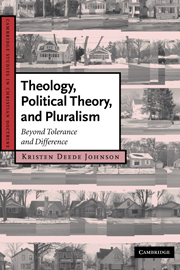3 - Beyond tolerance to difference
Published online by Cambridge University Press: 22 September 2009
Summary
Introduction
The conversation about how to live together in the midst of our diversity continues, and the voices we will listen to in this chapter are not satisfied with the contributions liberal theorists have made to the discussion. They find themselves questioning the desirability of tolerance and the feasibility of unity. More than that, they query the very approach that political liberalism takes to political theory, offering their own visions of life together, openly rooted in their beliefs about the nature of human being and reality, as a way to more fully celebrate difference and radicalize democracy.
In Richard Rorty's political theory, we saw one attempt to critique the more typical approaches of recent liberal thought. Rorty tried to move beyond the epistemological concerns and ambitions of the so-called Enlightenment project while retaining the legacy of certain liberal ideals and values that can form the basis of a “postmodernist bourgeois liberalism.” Stanley Fish questions the very ideals that Rorty embraces, trying to persuade his readers that the recognition that politics goes all the way down precludes hope for a simple or lasting harmony in the midst of our diversity. Fish's emphasis on the pervasiveness of conflict and its relation to democratic society opens a window into the role of ontology within political theory more generally. While Rorty and John Rawls want to avoid questions related to the nature of human being and “what there is” more generally, William E. Connolly argues that “every political interpretation invokes a set of fundamentals about necessity and possibilities of human being, about, for instance, the forms into which humans may be composed and the possible relations humans can establish with nature.”
- Type
- Chapter
- Information
- Theology, Political Theory, and PluralismBeyond Tolerance and Difference, pp. 82 - 139Publisher: Cambridge University PressPrint publication year: 2007



